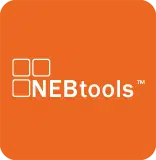The right DNA polymerase for your application
As the Polymerase Chain Reaction (PCR) is the most common DNA amplification method in molecular biology, NEB’s product portfolio features a large selection of polymerases geared towards this powerful method. As the first company to sell Taq DNA polymerase to the research market and the first to discover a PCR-stable, high-fidelity DNA polymerase, NEB has a long history of developing reliable and convenient PCR tools.
OneTaq DNA Polymerase & Q5 DNA Polymerase
NEBs commitment to innovative, high quality tools for DNA amplification and PCR products has continued with the development of OneTaq for robust routine PCR and Q5 High-Fidelity DNA Polymerase for robust, ultra high-fidelity PCR (~280x Taq fidelity). Both product lines have been developed to tolerate a variety of complex templates without experiencing a loss of performance on high-AT or high-GC targets. A variety of NEB polymerases, including OneTaq, Taq and Q5, also benefit from novel aptamer-based hot start technology that does not require a separate activation step.
Luna qPCR Products
Fluorescence-based quantitative real-time PCR (qPCR) is the gold standard for the detection and quantification of nucleic acids due to its sensitivity and specificity. Luna products from NEB are optimized for qPCR or RT-qPCR, and are available for either intercalating dye or probe-based detection methods. All Luna products provide robust performance on diverse sample sources and target types.
Isothermal Amplification
Despite the ubiquitous nature of PCR, it may not be the best option for all amplification needs. For point of care and other diagnostic applications, sequence-specific isothermal amplification methods, that eliminate the need for thermocycling, have been particularly useful. Instead of heat, these methods typically employ a strand-displacing DNA polymerase, like Bst DNA Polymerase, Large Fragment, to separate duplex DNA. To address some of the limitations of current isothermal amplification techniques, NEB has developed the next generation Bst, Bst 3.0 , 2.0 und Bst 2.0 WarmStart DNA Polymerasen version of this enhanced polymerase, which enables room temperature reaction set up, yet is fully active at temperatures greater than 50°C.
How to Choose the Right DNA Polymerase for PCR
Choosing the correct DNA polymerase for PCR depends on many factors. NEB offers a range of DNA polymerase formulations optimized for different applications. In this video Product Marketing Manager Fiona Stewart explains which products to choose for routine amplification, high-fidelity amplification, and next generation sequencing applications depending on the base content of your target amplicon. To choose the right DNA polymerase for your application please visit our PCR selection tool
Important Tips for Working with Q5 Polymerase
Are you using Q5® High-Fidelity DNA Polymerase? Then you probably already know how robust and accurate the DNA amplification is (greater than 100X Taq DNA Polymerase). Melanie has some tips for ensuring optimal performance with Q5. If you haven’t tried Q5 for your high-fidelity amplification yet, what are you waiting for?
Why Choose Q5 High-fidelity Polymerase?
Q5® High-Fidelity DNA Polymerase sets a new standard for both fidelity and robust performance across the GC spectrum. With the highest fidelity amplification available (more than 100 times higher than Taq), Q5 DNA Polymerase results in ultra-low error rates. Q5 DNA Polymerase is composed of a novel polymerase that is fused to the processivity-enhancing Sso7d DNA binding domain, improving speed, fidelity and reliability of performance. In this video Senior Applications Scientist Nicole Nichols explains which Q5 formulation is optimal for your specific PCR application.
How to Amplify GC-rich DNA
Amplification of GC-rich DNA can be challenging with traditional DNA polymerases. NEB offers a range of DNA polymerase formulations optimized for the amplification of GC-Rich DNA. In this video Senior Applications Scientist Nicole Nichols explains which products to choose for routine amplification, high-fidelity amplification, and next generation sequencing applications depending on the base content of your target amplicon.
Mehr Video Tutorials finden Sie auf NEBs YouTube Kanal.
NEB Tools
Use this tool when designing PCR reaction protocols to help determine the optimal annealing temperature for your amplicon. Simply input your DNA polymerase, primer concentration and your primer sequence and the Tm Calculator will guide you to successful reaction conditions.
Use this tool for your scientific calculations and conversions for DNA and RNA. Options include conversion of mass to moles, ligation amounts, conversion of OD to concentration, dilution and molarity. Additional features include sgRNA Template Oligo Design and qPCR library quantification.
NEBaseChanger can be used to design primers specific to the mutagenesis experiment you are performing using the Q5 Site-Directed Mutagenesis Kit. This tool will also calculate a recommended custom annealing temperature based on the sequence of the primers by taking into account any mismatches.
Use this tool to help select the right DNA polymerase for your PCR setup. Whether your amplicon is long, complex, GC-rich or present in a single copy, the PCR selection tool will identify the perfect DNA polymerase for your reaction.
Estimate the percentage of correct DNA copies (those without base substitution errors) per cycle of PCR for selected DNA polymerases.
Troubleshooting Guides
Usage Guidelines
- DNA Damage and PreCR
- General Guidelines for Successful RNA Purification Using the Monarch Total RNA Miniprep Kit
- Guidance on Choosing Sample Input Amounts when Using the Monarch Total RNA Miniprep Kit
- Guidelines for PCR Optimization with OneTaq and OneTaq Hot Start DNA Polymerases
- Guidelines for PCR Optimization with Taq DNA Polymerase
- Guidelines for PCR Optimization with Thermophilic DNA Polymerases
- Optimization Tips for Luna One-Step RT-qPCR
- Optimization Tips for Luna qPCR
Information material
Request brochures free of charge or use our PDF download.
Further information can be found in our Technical Resources section or at neb.com. Information on trademarks can be found here.








